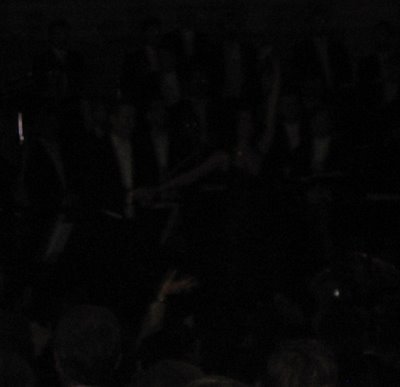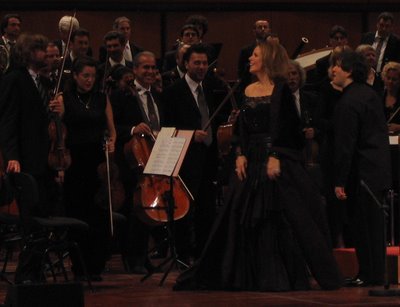Blogging is fun, but I will take a break from it. It really does take a lot of time, and while I enjoy chronicling my experiences, I have other ways of doing that. I never intended to blog indefinitely. Soon, I will remove my archives, but I will keep this account alive for possible occasional posts.
Lately I've enjoyed some great moments, most notably Andreas Scholl in a Bach program at the Barbican in London and Kiri Te Kanawa in an eclectic solo recital in Reading. I was fortunate enough to meet both singers following the performances.
Up next: Renee Fleming in two very different programs in Lucerne and London.
Thank you for reading.
Tuesday, November 28, 2006
Friday, November 17, 2006
Toni Morrison reads from her unpublished next novel at the Louvre
I don't think I've used this old line before, but I need to use it now: where to begin?
I will write later with details, but for the moment: Morrison read a moving and lyrical excerpt from her next novel, Mercy. It fit beautifully with the theme of her astonishingly stimulating program, titled The Foreigner's Home, this month at the Louvre. I have heard her read before (twice--well, almost three times--I happened to go to the bathroom and miss her reading from Jazz at Wynton Marsalis's Higher Ground Benefit in September 2005!), but I was not prepared for the beauty of this work or for the manifest excitement of knowing that this was a healthy glimpse at this great writer's next work, which she describes as "very much in progress."
Following the reading, there was a signing at the Louvre bookstore. Appropriately, I had Morrison sign the program's catalog. I thanked her ("very much") and she looked at me deliberately and replied, in her signature gravely voice, "You're welcome." Yes, on paper this sounds banal, and I have had her sign a book before (Love, in 2003), but this was a moment for me. It's too complicated and personal to get into here--suffice it to say that this day will go down as one of the great ones.
It doesn't hurt that I spent part of the afternoon in the peaceful autumnal splendor of the Jardin du Luxembourg.
Pictures and video to come.
I will write later with details, but for the moment: Morrison read a moving and lyrical excerpt from her next novel, Mercy. It fit beautifully with the theme of her astonishingly stimulating program, titled The Foreigner's Home, this month at the Louvre. I have heard her read before (twice--well, almost three times--I happened to go to the bathroom and miss her reading from Jazz at Wynton Marsalis's Higher Ground Benefit in September 2005!), but I was not prepared for the beauty of this work or for the manifest excitement of knowing that this was a healthy glimpse at this great writer's next work, which she describes as "very much in progress."
Following the reading, there was a signing at the Louvre bookstore. Appropriately, I had Morrison sign the program's catalog. I thanked her ("very much") and she looked at me deliberately and replied, in her signature gravely voice, "You're welcome." Yes, on paper this sounds banal, and I have had her sign a book before (Love, in 2003), but this was a moment for me. It's too complicated and personal to get into here--suffice it to say that this day will go down as one of the great ones.
It doesn't hurt that I spent part of the afternoon in the peaceful autumnal splendor of the Jardin du Luxembourg.
Pictures and video to come.
Wednesday, November 15, 2006
Saturday, November 11, 2006
Philippe Jaroussky
I am reading Balzac's Sarrasine at the moment. Witnessing the public's reaction to countertenor Philippe Jaroussky's creamy voice and youthful presence stirs interesting thoughts in my head. Born in 1978, the French singer seemed poised for an international career, but a Google search revealed that, inexplicably, he's no longer managed by IMG Artists. Now represented by a French firm, he's performing mostly in his homeland.
That's a shame, because he's one of the finest and most exciting young singers I've heard. His strikingly beautiful voice--rich, creamy, incandescent--covers a large range, from a strong chest register to shimmering tones above the staff. In Jaroussky's mouth, Vivaldi's florid (understatement of the season) coloratura sounds beautiful and natural. But he's equally at home in slow, introspective pieces, where he unleashes tender and luscious legato.
Following Thursday night's concert at the Theatre des Champs-Elysees, his label, Virgin Classics, hosted a signing to mark the release of Jaroussky's new disc. He and conductor Spinosi have a clear love for their work. They never stopped talking, carrying on a constant dialogue with fans who passed through. I didn't see one person who wasn't wearing a smile. It was an hour before I finally arrived at the signing table, and there remained at least a dozen people behind me.
[Note: I need to put some links in here. I also need to update a couple entries.]
That's a shame, because he's one of the finest and most exciting young singers I've heard. His strikingly beautiful voice--rich, creamy, incandescent--covers a large range, from a strong chest register to shimmering tones above the staff. In Jaroussky's mouth, Vivaldi's florid (understatement of the season) coloratura sounds beautiful and natural. But he's equally at home in slow, introspective pieces, where he unleashes tender and luscious legato.
Following Thursday night's concert at the Theatre des Champs-Elysees, his label, Virgin Classics, hosted a signing to mark the release of Jaroussky's new disc. He and conductor Spinosi have a clear love for their work. They never stopped talking, carrying on a constant dialogue with fans who passed through. I didn't see one person who wasn't wearing a smile. It was an hour before I finally arrived at the signing table, and there remained at least a dozen people behind me.
[Note: I need to put some links in here. I also need to update a couple entries.]
Wednesday, November 08, 2006
Sunday, November 05, 2006
Angela Gheorghiu at Salle Pleyel

There are two things I will remember about Saturday night's concert. One, Gheorghiu's vocal performance, which was excellent. But just as strongly burned into my memory was what happened once the official program had ended. Gheorghiu and the audience were so fervent in their mutual admiration that, after four encores, the management shut off all lights in the venue, leaving only emergency lighting to see us out. Gheorghiu remained on stage in complete darkness for several minutes, waving and bowing down to the ground, making her conductor do the same. It was a strange moment.
After the first encore (a lovely "Non ti scardar di me," capped with a blazing high C), Roberto Alagna came on stage to present his wife with a large bouquet. The crowd went wild. Here's video of that. (In the confusion, I did shake the camera quite a bit--sorry about that.)
Here's a bit of Gheorghiu bowing in complete darkness, as if nothing had happened. This time I move the camera about to show the state of the place: those weren't house lights, but emergency lights! You can see Gheorghiu illuminated a couple times by camera flashes.
More on the music and the post-performance performance, later. (I also have a pic or two taken before the blackout.)
Wednesday, November 01, 2006
Orchestra dell'Accademia Nazionale di Santa Cecilia, Antonio Pappano and Renee Fleming present all-Strauss program in Rome

More later.
UPDATE:
Santa Cecilia Hall, in Rome's Parco della Musica, is a beautiful venue filled with scarlet seats and cherry wood walls and ceilings. The sound in there is like nothing I've heard. The reverb is quite high, giving the impression of a liquid sound. Renee's voice swam in a Straussian sea.
Her performances of the Capriccio final scene and the Vier letzte Lieder were different from previous ones. They were more introspective than ever, and, especially in the Capriccio, there was a profound sense of sadness. (After the performance, she mentioned that there are so many ways to do it, and that it's different every night.) The explosive passion of "Caecilie", an encore, provided an appropriate contrast to the wistful poignancy of "Im Abendrot".
I will post more details later, but I wanted to share a bit of news about the program for Renee's upcoming concert at the Barbican. I am one of many, I am sure, who discovered the remarkable aria "Ich ging zu ihm," from Korngold's Der Wunder der Heliane, because of its inclusion on Homage: The Age of the Diva. Renee seems born to sing this rich and densely-orchestrated aria. It's in the sumptuous key of F# minor (the key of the final scene of Daphne and the trio from Der Rosenkavalier), and its undulating legato lines build intensity right up to the A# climax on the repetition of in Schmerzen ("in pain"), Heliane's qualified mea culpa (she gave of her body, but only in the youth's mind, and she did so only to console him). I asked if she has plans to sing this live, and she replied, "Yes! In London." Click here to listen to Lotte Lehmann's recording of the aria. Lehmann, who premiered the piece, inspired Renee's interpretation.
UPDATE (6:35pm, 11/4/06):
Before attending another live performance (Angela Gheorghiu at Salle Pleyel tonight), I wanted to get in a few more observations about Renee's Strauss concert on Tuesday.
I have heard Renee sing these pieces before (the Capriccio at Carnegie Hall and the Lieder at the Barbican), and also in recordings, but the performances on Tuesday were different. Pappano nursed subtle and sensuous playing from the orchestra, bringing out sparkling counterpoint. Renee sang completely in character, which is something that she does not do often at concert performances. During the "Moonlight Music" that opens the final scene of Capriccio, she wore an anxious expression. It was a nuanced, complex performance filled with gestures big and small. Most remarkable were the contrasting moments at the end. First, the power that she unleashed when she sang, "Will you be consumed by these two flames?" The weight in her voice even made me think of Salome's final scene. Second, the soft, subtle, slow, and introspective beauty of Madeleine's final words to her reflection. This was very different from her Carnegie Hall performance, which was louder, colorful and ironic. There were tears in her eyes as the orchestra played the lush finale. There's one part that sounds as if Madeleine is leaving--at that point, Renee sighed, rolled her eyes, and batted her eyelids. After the performance, I mentioned how differently she did this scene, and she said that there are so many ways to do it, and that it's different every night.
Her Vier letzte Lieder seemed to have been sung in one long breath. There is no question that she bears a strong emotional connection to this music.
Subscribe to:
Comments (Atom)